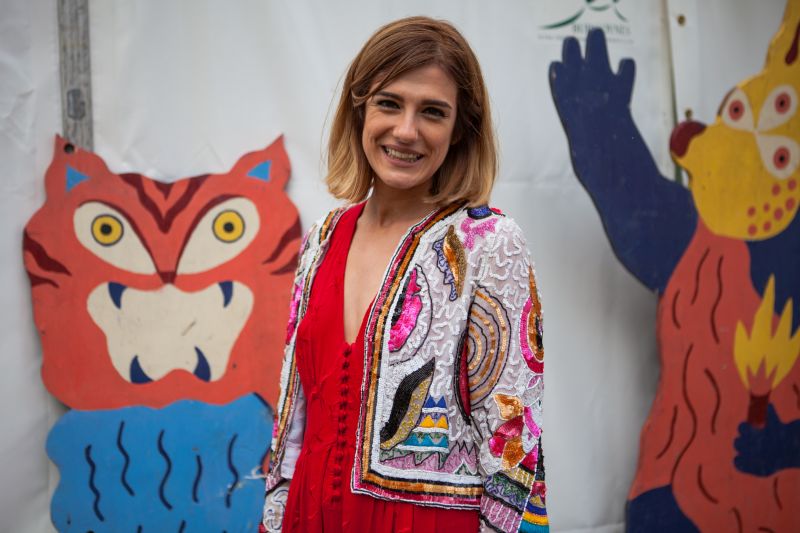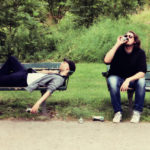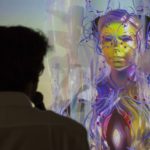Following her storming debut set on the Green Man Rising stage, former Pipette Ani Glass talks to GIITTV about her solo career, the importance of language within a culture, her interest in visual arts and why she’s not likely to be collaborating with her sister Gwenno.
During set you mentioned that Green Man is your first festival. I’m assuming you mean as a solo artist.
Yeah, it’s my first festival as Ani Glass. I’ve played festivals with bands before but it’s really different doing it by yourself; also singing in Welsh is new to me. Obviously, I’m in Wales, so that’s wonderful.
Surely it’s not your first Green Man.
No, I’ve been here a couple of times. Every time I go to gigs or festivals I get itchy feet and want to get on the stage. So it’s really nice to be able to play. I really, really enjoy it when there’s a great act playing. It’s really fantastic but it also inspires me. I just think “oh, I really wanna do that!” So now I’ve got here I’m feeling great!
Your recent single ‘Dance’ received a lot of critical acclaim. You’ve got this retro 80s pop but, I think, it’s fair to say that the lyrics are really dark. It’s all about the “hum of the engine” and being part of the machine. For someone who doesn’t speak Welsh it’s not immediately obvious. Is it an intentional subtle subversion?
No, not at all. With my first couple of bands we lived in England, so I wrote in English. I came back here and was in another band. We wrote in English but then I noticed that most people I was hanging out with were Welsh speakers, so I thought I should probably sing in Welsh. That’s how it came around. I don’t know if it’s perceived that way but it wasn’t intentional.
I understand that you’re currently working on a new EP. Is it going to be in Welsh as well?
Yes, it’s the same. I think one of the reasons why people who can’t speak Welsh were able to relate to the song was that I really took care in translating it and making sure the lyrics would work in English as well. Not that I think that singing in Welsh excludes other audiences. Most people are open to other languages. I’m going to work on for the rest of songs. I’m not going to sing them in English, but make sure that there is that meaning in the English lyrics people can really hold on to.
But I’ve read that the roots of ‘Dance’ go back to an exhibition called Silent Explosion that took place in Cardiff.
Yeah, that’s right. I’d written a couple of songs before I saw the exhibition, so the general feel of the whole EP is quite similar. The exhibition took it further but it’s the same set of ideas.
Was it all based around the theme of destruction?
Yeah, Ivor Davies did this exhibition in the National Museum in Cardiff. He is a really renowned international Welsh artist and my themes were similar to his. He used the Welsh language in his art, which really helped me. It gave me confidence in my music because I thought if someone could have a major exhibition like this, could be internationally renowned and be using the Welsh language… It made me feel that I could do that too!
Is using Welsh in your art practice something really important to you?
Really important. It’s not an entirely political stance because I just want to be able to keep speaking my language and for it to be relevant. I think in order for a language to feel relevant to young people, they have to have a culture that surrounds it. And I just want to feed into that culture to help young people who might want to do music to feel “that’s all right. If she can do that, I can do that.” I just want to make sure that we’ve still got something to talk about in Welsh, so we can talk about the Welsh music or the Welsh art.
Speaking of art, I know that you’re also a photographer and an artist. Do you exhibit at all?
I have done a bit. I had a couple of photography exhibitions which went quite well. I have had an illustration exhibition in Jacob’s market as well. At the moment I’m trying to pull them all together, so when I make my EP I’m going to use my photography and my art to create some sort of package. I don’t know what it’s going to be but I’m going to make something like a physical thing. It might not be a record, or a piece of art, or something to bring them all together.
Do you listen to music when you draw or draw when you’re thinking about music?
No, that’s one of the problems of wanting to bring them all together. I tend to do them all separately. If I’m inspired by the music, I let the other two go for a while. If I can’t write a song, then I go and draw a picture.
And do you have a date and a title for your new EP?
No date yet. It keeps moving but I’m not in a massive hurry. It’s going to be called Ffrwydrad Tawel, or Silent Explosion in English.
And, finally, have you considered any future collaborations with your sister Gwenno?
We were in The Pipettes for years, so we’re just doing our own thing at the moment. We’ve never spoken about it. It’s not like it would never happen but I think if it does happen it would be on a more artistic level, like I make some art rather than singing together. But you never know, do you? If a project comes up, there might be something.
For news about Ani’s new EP join her on Bandcamp, Facebook or Twitter.
Read full Green Man 2016 FESTIVAL REPORT.
Photo credit: Stephen Sibbald




